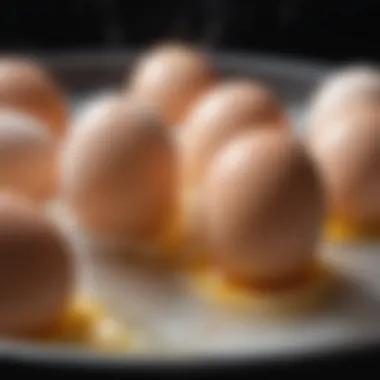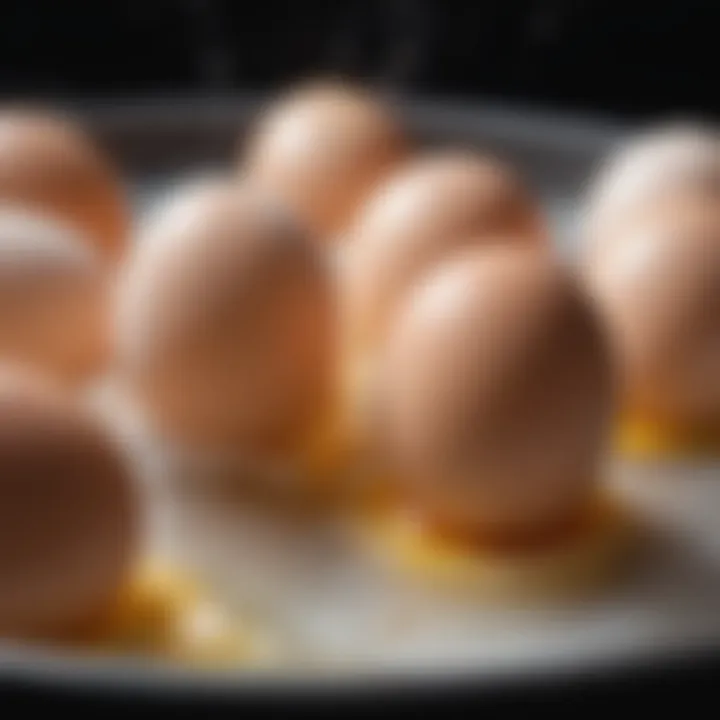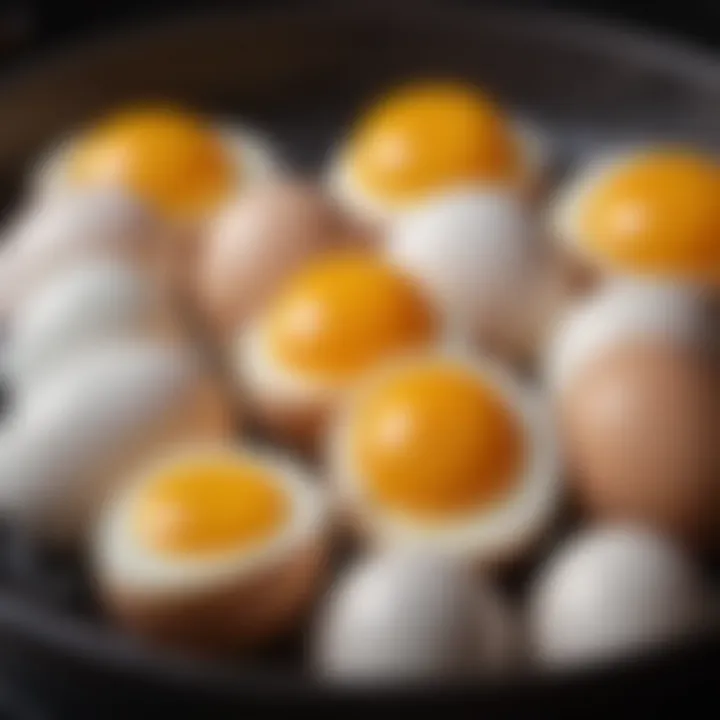The Art of Boiling Eggs: Perfect Times and Tips


Intro
Boiling eggs may seem like a simple task, yet many find it challenging to achieve the desired level of doneness. The intricacies of this process involve precisely timed cooking, the right techniques, and understanding how to troubleshoot when things do not go as planned. This guide provides essential knowledge for both beginners and experienced home cooks. It details the science behind boiling eggs, insights into egg selection, and effective preparation methods. Understanding these elements can elevate the humble boiled egg into a versatile addition to any meal.
Recipe Overview
Brief Summary of the Recipe
Boiling eggs can be divided into varying degrees of doneness, from soft-boiled to hard-boiled. Each level of doneness caters to different culinary uses. This recipe overview will guide you through the process while showcasing its culinary versatility.
Key Ingredients and Tools Needed
- Fresh eggs: Choose high-quality eggs for the best flavor and texture.
- Water: Enough to cover the eggs in the pot.
- Salt (optional): Can help prevent cracking and make peeling easier.
- Ice water: For the cooling process after boiling.
- Pot: A medium-sized pot suitable for boiling the number of eggs you wish to cook.
Step-by-Step Instructions
Detailed Cooking Steps
- Select your eggs: Fresh eggs yield better results. Older eggs can be difficult to peel.
- Prepare the water: Fill the pot with enough water to cover the eggs by about an inch. Consider adding a pinch of salt for easier peeling.
- Bring water to a boil: Over medium-high heat, bring the water to a rolling boil.
- Add the eggs: Carefully lower the eggs into the boiling water using a spoon to avoid cracking.
- Adjust the heat: Maintain a gentle boil throughout the cooking process.
- Timing is key:
- Cool the eggs: Once the desired time is reached, immediately transfer the eggs to an ice water bath. Allow them to cool for at least 5 minutes.
- Peel and enjoy: Gently tap the eggs to crack the shell, then peel under running water for simplicity.
- For soft-boiled: 4-6 minutes
- For medium-boiled: 7-9 minutes
- For hard-boiled: 10-12 minutes
Tips for Successful Execution
- Room temperature eggs: If possible, use eggs that are at room temperature; they cook more evenly.
- Avoid overcooking: Boiling for too long can create a grayish ring around the yolk and a rubbery texture.
- Experiment: Different stoves and pots may yield varied results. Adjust times to find what works best for you.
Boiling eggs is a simple yet precise cooking technique. Mastery of this skill can significantly enhance your culinary repertoire.
This guide aims to demystify the boiling egg process, ensuring perfect results and enriching your cooking experience. Understanding each step allows for more control in the kitchen, enabling you to enjoy boiled eggs like never before.
Understanding Egg Structure
Understanding the structure of an egg is fundamental for anyone looking to master the art of boiling eggs. Each component of an egg plays a crucial role in how it cooks, how it can be prepared, and ultimately its taste and texture. Knowledge of these aspects becomes particularly relevant when applying various boiling techniques to achieve desired doneness levels.
Composition of an Egg
An egg consists of several parts, each with its specific function. The shell, made primarily of calcium carbonate, provides a protective barrier. Inside, there is the egg white, or albumen, which is about two-thirds of the egg's weight. The egg white is mostly water and proteins, which coagulate during cooking. This coagulation is essential for achieving the perfect texture in boiled eggs.
The yolk is the most nutrient-rich part. It contains fats, proteins, vitamins, and minerals. The yolk also contributes to the flavor and color of the boiled egg. Its composition changes based on the hen’s diet, affecting both taste and nutritional value. Hence, selecting eggs based on their origin can make a significant difference in your final dish.
How Freshness Affects Cooking
Freshness is a critical factor in egg boiling. As eggs age, the pH level of the egg white increases. This change makes the egg whites less acidic, which may lead to a watery texture when cooked. Older eggs may also be more difficult to peel after boiling. A fresh egg has a tighter white, providing a firmer structure when boiled. The yolk is also typically more vibrant in color and richer in flavor when the egg is fresh.
For optimal results when boiling eggs, use eggs that are as fresh as possible. If unsure of freshness, a simple water test can help; a fresh egg sinks in water, while an older one tends to float. This method is an easy way to determine the best eggs for boiling, ensuring a quality result.
"Fresh eggs result in better texture and flavor for boiling, enhancing the overall culinary experience."
The Fundamentals of Boiling Eggs
Understanding the fundamentals of boiling eggs is essential for achieving the desired results in both cooking and culinary presentation. Mastering this technique not only elevates the quality of dishes but also enhances overall kitchen confidence. Proper knowledge about boiling eggs serves multiple benefits, including the ability to control doneness, improve peeling processes, and utilize eggs efficiently in various meals throughout the day.
Choosing the Right Eggs
Choosing the right eggs is the first step in ensuring a satisfying boiling experience. Freshness is a primary factor to consider, as it affects taste, texture, and ease of peeling. Fresher eggs tend to be firmer and more stable during boiling. It is also important to select eggs with intact shells; cracked eggs might lead to leaking during cooking.
When selecting eggs, consider these aspects:
- Source: Organic and free-range eggs are often considered superior in taste and quality compared to conventional options.
- Size: The size of the eggs can influence cooking times. Standard large eggs are typically ideal for boiling.
- Packaging Date: Check the pack date for freshness. Older eggs may peel more easily after boiling but might compromise taste and nutrition.
In summary, selecting the right eggs is vital. The right choice sets the foundation for boiling success, ensuring enhanced flavor and better culinary applications.


Preparation Steps
Preparation plays a crucial role in how well eggs will boil. Following proper preparation steps can minimize problems like cracking and ensure even cooking. Here are some significant points to consider:
- Bring Eggs to Room Temperature: Allowing eggs to rest at room temperature for 30 minutes before boiling can reduce the likelihood of cracking due to sudden temperature changes.
- Use the Right Pot: Choose a pot that holds eggs in a single layer. This promotes even cooking. A larger pot may create unnecessary agitation during boiling.
- Add Salt or Vinegar: Adding a pinch of salt or a splash of vinegar to the water can help facilitate peeling and reduce the chances of cracks.
- Water Level: Ensure that there is enough water to cover the eggs by at least one inch. This creates a buffer and promotes even heat distribution.
Following these preparation steps allows for smoother boiling processes. It simplifies the task, ultimately resulting in better texture and flavor in boiled eggs.
Boiling Duration: A Breakdown
Understanding boiling durations is essential for achieving the desired outcomes when cooking eggs. Different times yield different results, influencing both texture and flavor. This section will discuss the specific durations necessary for soft, medium, and hard boiled eggs and the significance of maintaining accuracy during the process.
Soft Boiled Eggs
Time Needed
Soft boiled eggs are known for their delicate yet slightly set whites encasing a warm, runny yolk. The recommended cooking time for soft boiled eggs ranges from 6 to 7 minutes. This specific duration allows enough heat to penetrate the egg while preserving that preferred runny yolk. Opting for soft boiled eggs is popular among those who enjoy the unique texture and rich flavor they provide. However, their shorter cooking time can make precision crucial. A moment too long can transition the yolk from creamy to fully set, which might change the overall quality.
Optimal Temperature
The optimal temperature for boiling soft eggs is around 190 to 200 degrees Fahrenheit. This temperature is essential for creating the ideal cooking environment to achieve that perfect soft center. At this temperature, the proteins in the egg whites start to denature slowly, allowing them to firm up without overcooking the yolk. The choice of this temperature ensures that the egg maintains its characteristic taste. On the downside, if the temperature is too high, it may result in rubbery whites and a less enjoyable texture.
Medium Boiled Eggs
Time Needed
For medium boiled eggs, the cooking time increases slightly, typically falling between 8 to 9 minutes. This duration gives a firmer white while ensuring the yolk is creamy yet partially set. Medium boiled eggs are quite versatile and perfect for numerous culinary applications. However, the challenge with this time range is still maintaining precision. Overcooking beyond this timeframe leads to a hard yolk, which might not satisfy those who prefer a softer result.
Optimal Temperature
Medium boiled eggs should be cooked at a similar temperature to soft boiled eggs, around 190 to 200 degrees Fahrenheit. This temperature range remains effective in achieving the desired texture while allowing for the internal temperature of the yolk to be just right. A consistent temperature during boiling plays a key role in the final outcome. If the temperature fluctuates significantly, it could complicate the cooking process, leading to unpredictable results since the timing also depends on the exact conditions.
Hard Boiled Eggs
Time Needed
Hard boiled eggs are best accomplished by cooking them for 10 to 12 minutes. This timeframe assures that both the whites and yolks are fully set, forming a solid egg. Many people appreciate hard boiled eggs for their utility in salads, as snacks, or even in various dishes. While this seems straightforward, the nuance lies in exact timing. Cooking longer than necessary can lead to undesirable greenish edges around the yolks, caused by the presence of sulfur and iron reacting under heat.
Optimal Temperature
To effectively prepare hard boiled eggs, the recommended optimal temperature also remains at 190 to 200 degrees Fahrenheit. This steady temperature allows for a gradual cooking process, yielding a consistently firm and creamy yolk without overcooking. A well-regulated temperature prevents cracking and enhances texture, but excess heat can lead to toughness in both whites and yolks. In summary, controlled temperature and precise timing bring collective success in producing hard boiled eggs.
Techniques for Perfect Boiled Eggs
Achieving the perfect boiled egg requires more than just boiling water and dropping your eggs in. The method you choose can significantly influence the outcome, from texture to flavor. This section covers three popular techniques: the stovetop method, the Instant Pot method, and the sous vide method. Understanding these techniques can help you achieve consistent results and cater to your specific preferences for doneness.
Stovetop Method
The stovetop method is perhaps the most traditional and familiar approach to boiling eggs. It involves simmering eggs in a pot of water. This technique is simple and does not require any special equipment, making it accessible for most home cooks.
To begin, place your eggs in a single layer at the bottom of a pot. Cover them with cold water about an inch above the eggs. Slowly bring the water to a rolling boil, and then immediately reduce the heat to a gentle simmer. The time you leave the eggs in this simmering water determines the level of doneness.
- For soft-boiled eggs, leave them in for about 6 to 7 minutes.
- For medium-boiled, aim for 8 to 9 minutes.
- For hard-boiled eggs, a duration of 10 to 12 minutes is ideal.
Once the timer goes off, the next crucial step is shocking the eggs in an ice bath. This rapid cooling halts the cooking process and aids in easier peeling.
Instant Pot Method
The Instant Pot method is gaining popularity due to its convenience and consistent results. Using this multi-cooker allows for precise timing and pressure control, which substantially reduces the risk of overcooking.
To use the Instant Pot for boiling eggs, place a steaming rack in the bottom of the pot, then add water—about one cup usually suffices. Arrange your eggs on the rack, making sure they are not stacked on top of one another.


Set the Instant Pot to manual high pressure. Cooking time varies based on your desired doneness:
- For soft-boiled, set it for 3 minutes.
- For medium-boiled, aim for 5 minutes.
- For hard-boiled, 7 minutes is recommended.
After the cooking time is over, use the quick release option to relieve the pressure, and then transfer the eggs to an ice bath to cool.
Sous Vide Method
The sous vide method offers precision cooking that ensures a controlled temperature throughout the cooking process. This technique results in a consistently cooked egg, with options for very specific textural outcomes.
To employ this method, preheat a water bath to your desired cooking temperature:
- For soft-boiled, set to 63°C (145°F) and cook for 45 minutes.
- For medium-boiled, 68°C (155°F) for 45 minutes.
- For hard-boiled, 75°C (167°F) for 13 to 15 minutes.
Once the eggs are finished cooking, place them in an ice bath to stop the cooking process. The sous vide typical method results in eggs that are easy to peel and perfectly cooked without risk of rubberiness.
Each of these methods offers unique advantages, ensuring that whether you prefer a classic approach or modern convenience, you can achieve excellent results.
In summary, picking the right method for boiling eggs comes down to your personal preferences and the resources at your disposal. Each technique has distinct benefits, making your choice essential for achieving the perfect boiled egg.
Common Challenges in Boiling Eggs
Boiling eggs seems straightforward, yet various challenges can arise. Understanding these issues is crucial to mastering the art of boiling eggs. Addressing common problems not only enhances the cooking experience but also leads to better results. The reader should recognize that challenges such as cracks during boiling and difficult peeling can remind one of the nuances involved in culinary practices. By exploring these topics in-depth, one gains valuable insights that can elevate the everyday task of boiling eggs into a more predictable and enjoyable process.
Cracking During Boiling
Cracking of eggs during boiling is a frustrating occurrence that many home cooks face. This often happens due to temperature shock when cold eggs are placed into boiling water. The rapid change in temperature can cause the egg's shell to crack, leading to undesirable results in presentation and cleanliness.
To minimize cracking, start by allowing eggs to reach room temperature before boiling. Alternatively, gently lower the eggs into the water using a spoon. This slower immersion helps to prevent sudden shocks that lead to breaks.
Another useful tip is to add a small amount of vinegar to the boiling water. This can help to stabilize the egg whites, thus limiting the cooking mess if a crack happens. Understanding the physical reactions that eggs undergo in heat will help the cook manage this challenge more effectively.
- Ensure eggs are not too cold: Bringing eggs to room temperature can greatly reduce the chance of cracking.
- Lower them gently: Use a spoon to place eggs into boiling water.
- Add vinegar: This may help contain leaks if cracks occur.
Difficult Peeling
Peeling boiled eggs can sometimes become an ordeal, especially when dealing with fresh eggs. Fresh eggs tend to bond more closely to their shells, making peeling difficult and often resulting in unsightly pieces of egg white being lost. Knowledge of the egg structure and cooling processes can alleviate these challenges.
To achieve better results, opt for slightly older eggs if available. Older eggs have air pockets that make the peeling process easier. Another recommended practice is to shock the eggs by placing them in an ice water bath immediately after boiling. This sudden cooling can cause the egg to contract slightly away from the shell, making it easier to peel.
Moreover, peeling under running water can remove stubborn bits of shell that stick to the egg. The flow of water assists in separating the adhered shell fragments, leading to a cleaner and more favorable outcome.
- Choose older eggs: They are simpler to peel due to air pockets.
- Ice bath after boiling: This helps to loosen the shell.
- Peel under running water: It aids in removing stubborn shell pieces.
Mastering these challenges can lead to a more enjoyable experience and superior results when boiling eggs. By applying these strategies, the cook can feel more confident and effective in the kitchen.
Cooling and Storing Boiled Eggs
The process of cooling and storing boiled eggs is crucial for maximizing their freshness and flavor. Once eggs are boiled, they undergo a transformation in texture and taste that can be adversely affected if not handled properly. Understanding the importance of cooling techniques and appropriate storage practices can enhance the culinary experience and ensure that the eggs retain their quality for consumption.
Cooling Techniques
Proper cooling techniques are essential to stop the cooking process immediately after boiling. If eggs remain in hot water, they can become overcooked, leading to an undesirable rubbery texture and an unsightly green ring around the yolk. Cooling eggs quickly in ice water is one of the most effective methods. Here’s how to do it:
- Prepare an ice bath: Fill a large bowl with cold water and ice cubes. Ensure you have enough ice to lower the temperature efficiently.
- Transfer the eggs: Using a slotted spoon, gently transfer the boiled eggs from the hot water to the ice bath. Be careful to avoid cracking the shells during this process.
- Let them cool: Allow the eggs to sit in the ice water for at least 5-10 minutes. This quick cooling helps prevent further cooking and makes peeling easier later.
Alternatively, you can cool the eggs under running cold water. Hold the eggs in a colander and rinse them under cold tap water. This method also works but might not be as effective as an ice bath for rapid cooling.
Storage Guidelines
After boiling and cooling, proper storage becomes vital to maintain the eggs’ quality. Here are the key guidelines:


- Refrigerate promptly: Store boiled eggs in the refrigerator within two hours of cooking to prevent bacterial growth. The ideal temperature for storing eggs is below 40°F (4°C).
- Use a container: Place the eggs in a covered container to protect them from absorbing strong odors in the fridge. Keeping them in their shells until ready to eat helps preserve moisture and prevents odor transfer.
- Labeling: If you have boiled a batch of eggs, label the container with the date they were boiled. Hard-boiled eggs are best consumed within one week for optimal freshness.
- Peeling: If you plan to peel the eggs ahead of time, it is advisable to do so just before consumption. Once peeled, store them in a covered container with a little water to keep them moist while in the fridge. Change the water every few days to maintain freshness.
"Proper cooling and storage extend the shelf life of boiled eggs while maintaining their flavor and texture. Take the extra steps for a quality experience."
By understanding the appropriate cooling techniques and effective storage guidelines, you can ensure that your boiled eggs remain a valuable culinary asset, whether for everyday cooking or special occasions. This not only results in better taste but also offers convenience and safety.
Nutritional Aspects of Boiled Eggs
Understanding the nutritional profile of boiled eggs is vital for those who wish to incorporate this food into their diet thoughtfully. Eggs are often labeled as a complete protein source. This means they provide all nine essential amino acids necessary for the body's functioning. The ease of cooking and versatility makes them a staple in many diets. In this section, we will discuss the numerous health benefits and important dietary factors to consider when adding boiled eggs to one’s meals.
Health Benefits
Boiled eggs offer various health advantages, which contribute positively to overall well-being. Some main benefits are:
- High Protein Content: One boiled egg contains around six grams of high-quality protein. This can help in muscle repair and growth, making it an excellent post-workout snack.
- Rich in Vitamins: Eggs are packed with vitamins A, B12, and D, which are essential for vision, energy metabolism, and bone health respectively.
- Choline Source: They are rich in choline, a nutrient important for brain health and cellular structure. Adequate choline intake supports cognitive functions, making eggs beneficial for mental clarity.
"The nutritional value of boiled eggs makes them a powerful food choice for supporting a balanced diet and healthy living."
- Heart Health: Recent studies suggest that moderate consumption of eggs does not significantly affect cholesterol levels for most individuals. They can actually promote healthy HDL cholesterol, which combats heart disease.
- Weight Management: Their protein content contributes to a feeling of satiety, which helps control appetite. Including boiled eggs in meals may support nutrition efforts aimed at weight loss or maintenance.
Dietary Considerations
When including boiled eggs in one's diet, certain considerations should be kept in mind:
- Allergy Concerns: Some individuals may be allergic to eggs. Symptoms can range from mild gastrointestinal discomfort to severe reactions. Individuals with known allergies should avoid consumption.
- Moderation: While eggs are healthful, moderation is important. The American Heart Association suggests up to one egg per day as part of a healthy diet for most people.
- Sodium and Additives: When considering boiled eggs in meals, check any additional ingredients such as salt or condiments that may raise sodium levels.
- Dietary Restrictions: For those following vegan or whole-food plant-based diets, boiled eggs are not suitable. It is important to seek alternative protein sources that align with these dietary choices.
Culinary Uses for Boiled Eggs
Boiled eggs serve as a versatile ingredient in many culinary contexts. Their versatility reflects not only their flavor but also their nutritional attributes. This segment explores how boiled eggs find their place in various dishes, emphasizing their roles in salads, sandwiches, and as standalone snacks.
In Salads and Sandwiches
The addition of boiled eggs can elevate salads and sandwiches. In salads, they offer protein alongside vegetables, making the meal more satisfying. For instance, in a classic Caesar salad, chopped boiled eggs can bring richness to the dish, and their texture complements the crispy lettuce and crunchy croutons.
In sandwiches, boiled eggs can enhance flavor and add a creamy texture. Egg salad sandwiches leverage this aspect fully. Combining finely chopped boiled eggs with mayonnaise and seasonings creates a filling that is both flavorful and easy to prepare. This simple dish illustrates not just the practicality but the joy of using boiled eggs in cooking.
- Benefits of Using Boiled Eggs in Salads and Sandwiches:
- Increases protein content.
- Adds texture and creaminess.
- Quick to prepare and integrate into meals.
"A hard boiled egg can be the perfect balance of nutrition and convenience in any meal."
Additionally, the aesthetic appeal of boiled eggs, when sliced or quartered, can enhance the visual composition of a dish. This attribute is beneficial for occasions where presentation matters.
As a Healthy Snack
Boiled eggs also fit well as a healthy snack option. They are nutrient-dense, providing proteins, healthy fats, and essential minerals. Unlike many processed snack foods that are high in sugars and unhealthy fats, boiled eggs are not only satisfying but also contribute positively to dietary intake.
- Key Reasons to Consider Boiled Eggs as a Snack:
- Low in calories yet filling.
- Portable and easy to carry.
- Variety of serving options, can be eaten plain or with seasonings.
Some individuals prefer to sprinkle a bit of salt or pepper for flavor or even dip them in hot sauce for an added kick. The convenience of being able to boil several eggs at once and have them ready for the week is an attractive quality that many people appreciate.
In summary, boiled eggs are not just a staple; they are a culinary ally. Their use in salads, sandwiches, or as standalone snacks enhances meal enjoyment and nutritional value.
Culmination
The conclusion of this article serves as a crucial recap and reflection on the process of boiling eggs. This cooking technique may seem simple, yet it involves science, timing, and specific methods to achieve ideal results. Understanding the nuances of boiling eggs can significantly enhance one's cooking repertoire and elevate a meal. The value of mastering boiling eggs stems from their versatility in the culinary world.
Recap of Key Points
Several points stand out from our exploration:
- Egg Structure: Recognizing the structure and composition of eggs can help in understanding how they cook.
- Boiling Durations: We examined the precise times needed for soft, medium, and hard-boiled eggs to easily cater to personal preferences.
- Techniques: Various methods such as stovetop, Instant Pot, and sous vide provide options based on convenience and outcome.
- Challenges and Solutions: We identified common issues like cracking and peeling, along with effective strategies to overcome them.
- Nutritional Benefits: Boiled eggs are rich in protein and various vitamins, making them a healthy addition to any diet.
Final Thoughts on Boiling Eggs
In summary, boiling eggs is more than just a culinary task; it reflects a deeper understanding of food science. For food lovers and home cooks alike, the techniques discussed in this guide can lead to improved culinary skills. Mastery of boiling eggs showcase how simple ingredients can deliver nutritious and delicious results. As you experiment with boiling and integrating boiled eggs into your meals, remember that practice always leads to perfection. Each boiled egg brings with it an opportunity to explore, create, and appreciate the joys of cooking.







